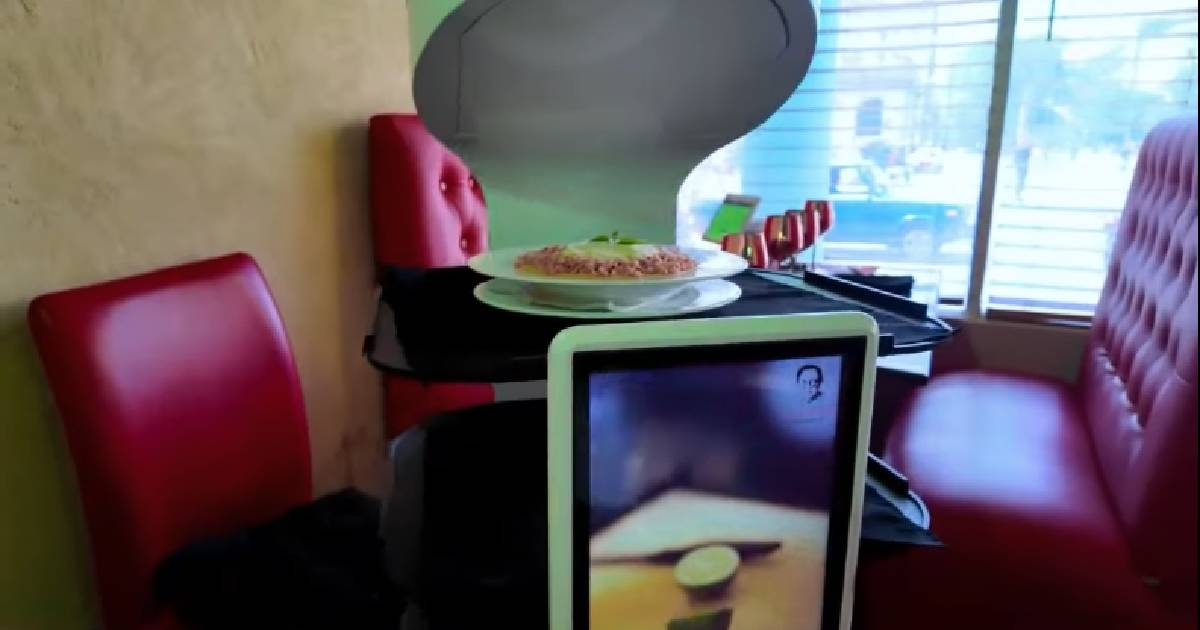
Related videos:
In a scene that many would have thought impossible in present-day Cuba, a private restaurant in Centro Habana has broken the mold by introducing a robotic waitress to serve its customers, defying power outages, technical shortages, and the limited access to the internet on the island.
It is about the restaurant "Doña Alicia," which has been offering traditional cuisine for seven years in one of the most populated neighborhoods of the capital. It has garnered national and international attention for its technological innovations, being the first Cuban restaurant with touchscreens at each table (2018), and now it is launching its robotic service.
In addition to the digital tablets on the tables and the use of the virtual assistant Alexa, a robotic waitress now delivers dishes directly to the diners.
“¡I thought I was in a cartoon movie!” exclaimed Sonia Pérez, a 64-year-old customer, interviewed by the news agency The Associated Press.
"I wish everyone were like this. That there were more in Cuba of this magnitude. We are really very behind in technology," he noted.
Despite frequent connection drops and power outages caused by the energy crisis affecting the island, the restaurant has successfully maintained its innovative system, which allows customers to order directly from screens located at each table.
The internal operations are also automated: in the kitchen, orders are managed with a virtual system that notifies if a dish is on time or delayed. Although the menu is based on traditional dishes like pork steak, pasta, or mojitos, the digital experience completely transforms the visit.
"Children and adults find it interesting… an assistant that brings food to your table… it gives you a new sensation," commented Yadiel Hernández, the restaurant manager.
"It makes us stand out. People come seeking quality, comfort in service, and that adds extra value," he emphasizes.
In a country where internet access has been limited for decades—only in 2018 was mobile connectivity enabled, and even today there are frequent service interruptions—a venue with digital automation, voice assistants, and robots on-site is truly a rarity.
Even several Cuban youtubers have shared their experience at Doña Alicia.
Although the restaurant prices are not affordable for the average Cuban, the proposal has sparked the curiosity of both residents and tourists alike.
Frequently asked questions about the robotic waitress in a restaurant in Havana
How has a restaurant in Cuba managed to incorporate advanced technology like a robotic waitress?
The restaurant "Doña Alicia" in Centro Habana has overcome the technological limitations of Cuba by using digital tablets, virtual assistants like Alexa, and now a robot waitress, despite power outages and limited internet access on the island. This innovation has been made possible thanks to its focus on enhancing the customer experience and differentiating itself in the market.
What impact does technology have on the dining experience at the restaurant "Doña Alicia"?
The technology at “Doña Alicia” completely transforms the dining experience for guests, allowing them to order directly from touchscreen screens at each table and receive their dishes from a robotic waitress. This creates a novel sensation for both adults and children, enhancing the quality and comfort of the service.
Why is the incorporation of technology important in a country with as many shortages as Cuba?
The incorporation of technology in Cuba is an example of innovation and resilience in the face of existing technological limitations. Despite frequent power outages and lack of infrastructure, initiatives such as the restaurant “Doña Alicia” demonstrate that it is possible to improve services and attract both domestic and international customers with modern and unique offerings.
How does Cuba's technological situation compare to the government's aspirations in artificial intelligence?
While the Cuban government, led by Miguel Díaz-Canel, promotes the use of artificial intelligence to "emancipate" the country, the reality shows a contrast between the official discourse and the available infrastructure, which still faces serious shortcomings. Private initiatives like that of the restaurant “Doña Alicia” stand out in an environment where access to the internet and modern devices remains a luxury.
Filed under: